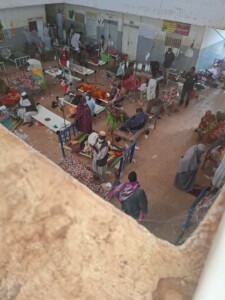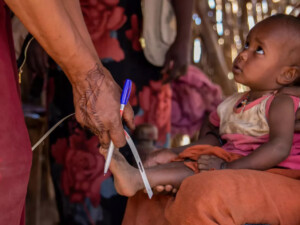Cholera cases ‘transferred to Khartoum’: doctors
Patients with cholera, or ‘acute watery diarrhoea’, are reportedly being transferred to the capital of Sudan. The cases come from White Nile state, where the disease has taken-on epidemic proportions.
Patients with cholera, or 'acute watery diarrhoea', are reportedly being transferred to the capital of Sudan. The cases come from White Nile state, where the disease has taken-on epidemic proportions.
Information from doctor colleagues has led Dr Syed Ginat to believe that several hospitals in Khartoum have received cases of watery diarrhoea from White Nile state; in the military hospital, the academic hospital, Ibrahim Malik hospital, and Omdurman hospital.
Dr Ginat told Radio Dabanga in an exclusive interview that diarrhoea can be vaccinated against, “but this requires the government to declare that the disease has officially entered the pandemic stage”.
Meanwhile he blamed Sudanese epidemiologists for causing a lack of clarity on the nature of the diarrhoea epidemic: “It can be scientifically confirmed whether it is related to cholera or simply watery diarrhoea.”
Laboratory tests conducted by the Central Committee of Sudanese Doctors in January confirmed the samples of 'acute watery diarrhoea' to be cholera, and a Sudanese epidemiology specialist and his colleagues are convinced of the same.
Mobilisation
Dr Ginat pointed to the dangers of the lack of quarantined spaces, as temporary isolation centres in schools are “inadequate” and can be “a major disaster and danger to neighbouring areas”.
He thinks that in order to force authorities to acknowledge the epidemic in Sudan, whether it is cholera or not, people should mobilise to gather attention. “People in White Nile have so far organised two sit-ins, without finding any support at the national level.”
The doctor urged the competent authorities to provide health awareness to people, about safe drinking water and proper use of toilets, in order to combat the transmission of the disease.
Cases in cities
In January this year, a report by the Central Committee of Sudanese Doctors recorded two deaths at Bahri educational hospital in Kharoum, with a total number of cases of 21. Bahri educational and Ibrahim Malik hospitals were seeing 30 cases a day at the time, and El Banjadeed hospital received 70 cases.
Last week the committee reported that the epidemic has spread to the outskirts of Khartoum and El Gezira states. 40 people died of cholera and more than 1,800 people were infected in White Nile in the recent weeks.
Also a hospital in El Obeid, the capital of North Kordofan, received 55 cases of acute watery diarrhoea in one week's time. A local doctor suggested a ban on vegetables coming from White Nile. Cases were recorded again in Sennar.
New cases in Rabak
On Sunday, Rabak, the capital of White Nile state, recorded 18 new patients infected with cholera. Abdelrahman El Siddig, the head of civil society organisations, told Radio Dabanga that the health centre in Teiba reported five cases while three cases were registered in El Gezira Aba.
“The government is transferring the patients from infected areas to healthy areas, which poses a danger to the health of local communities,” El Siddig claimed. “It does not care about treating water pollution.”
He added that the authorities have opened centres where new cases can be reported. “But these centres do not provide reliable information because they deliberately reduce the number of infected people.”
Stable numbers in Kosti
Yesterday journalist El Tahir El Doma told this station that the situation in Kosti, also in White Nile, has become “stable, in terms of the number of cases”. He reported no new deaths.
The number of hospitalised cases now reached 22 in the Ophthalmology Hospital, an increase of less than four cases from Saturday morning. There are still 27 to 30 cholera patients in the isolation centre at Block 54 in the western part of Kosti.
“Medicines appear to be available, but the problem is the ongoing new infections,” El Doma said. Recent rains caused the spread of flies and stagnant dirt in Kosti, contributing to the spread of the disease, in addition to the lack of safe drinking water.
South Sudan
Meanwhile in South Sudan's River Nile, at least 248 people have died from cholera outbreak across 19 counties, since the initial outbreak was officially declared in June 2016. The UN Office for Coordination of Humanitarian Affairs (OCHA) reported last Sunday that children and young adults under 30 years are the most affected by 'active transmission of the disease'.











 and then
and then